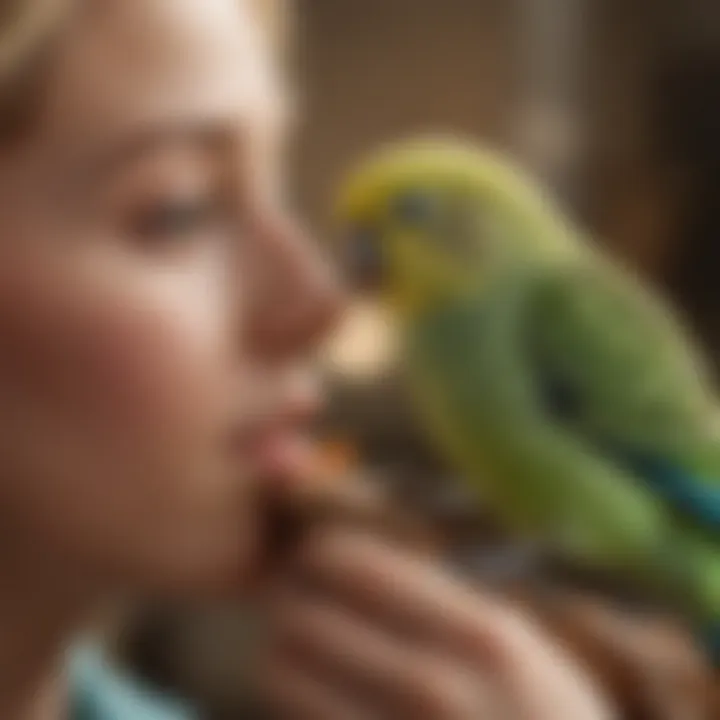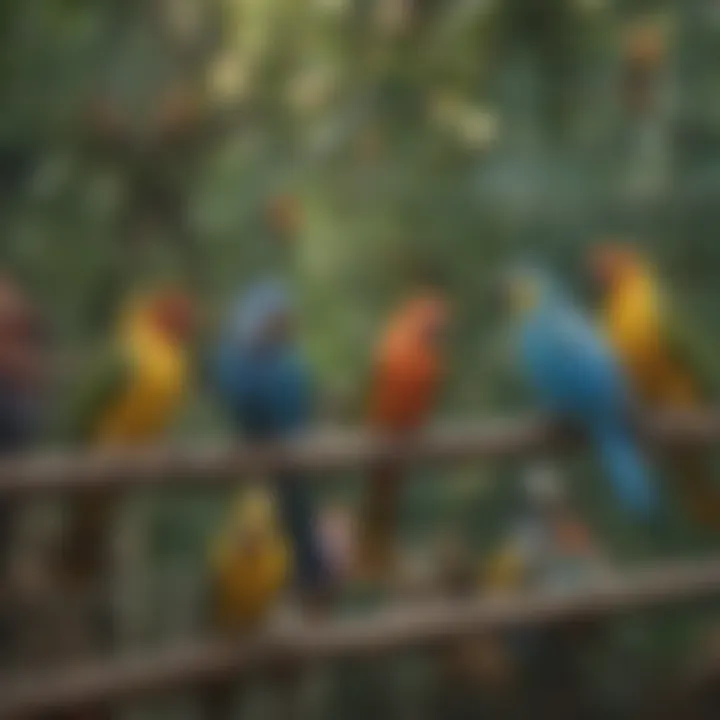Great Companions: The Role of Birds in Our Lives


Intro
Birds have been more than just winged creatures gracing our skies; they have formed a rich tapestry in human lives. From the vibrant chirp of a canary to the playful antics of a parrot, these feathered companions add layers of joy, serenity, and intrigue to our everyday existence. But it's not just about aesthetics or the novelty of having a pet—birds can offer profound mental and emotional support, much like dogs or cats, though often overlooked.
In this exploration of the avian world, we will dive into the unique characteristics that make birds ideal companions for humans. Through understanding their needs and quirks, bird owners can establish a nurturing environment that benefits both bird and human. Areas of focus will include essential care practices, behavioral insights, nutritional guidelines, health considerations, and enriching activities that promote well-being. So, let’s spread our wings and explore the compelling reasons why birds charm human lives!
Prologue to Avian Companionship
The relationship between humans and birds is a remarkable tapestry woven over centuries, highlighting a bond that transcends mere ownership. Understanding avian companionship provides not only a glimpse into the beauty of these creatures but also illuminates the benefits they bring to human lives. The allure of birds as pets goes beyond their striking color and melodious songs; it involves shared experiences, emotional connections, and insights into behaviors that can inform and enrich our daily lives.
Birds offer a unique form of companionship that resonates with many. Unlike cats or dogs, they often require specific environments and care, prompting owners to learn and adapt, creating a mutual journey of growth. Observing their natural behaviors brings joy and wonder to everyday existence. From the delicate trill of a canary at dawn to the playful antics of a cockatiel, these small beings can infuse life with light and liveliness.
Moreover, the importance of understanding cultural views on birds cannot be overstated. They hold significant places in various societies, often symbolic of freedom and beauty. As we explore different species of birds, we recognize that each brings its own story, enhancing our appreciation for their role in both personal and cultural contexts.
In sum, diving into the realm of avian companionship teaches us not only about the practical aspects of bird care but also about the deeper emotional and sociocultural relationships we can foster with these feathered beings. Understanding how to better connect with them can elevate the pet-owning experience and provide insights into the nature of companionship itself.
The Appeal of Birds as Pets
Bringing a bird into the home presents a myriad of appealing factors. For starters, they often require less space compared to larger pets. For city dwellers or those with limited living arrangements, birds can often thrive in smaller households without the need for expansive backyards.
Benefits of Bird Companionship:
- Low Maintenance: Generally, pet birds demand less daily maintenance than some larger pets. They might not need daily walks nor constant attention like dogs do.
- Intelligence: Certain species, especially parrots, exhibit remarkable intelligence, learning to mimic human speech and performing various tricks. This cognitive engagement makes them fascinating companions.
- Aesthetic Pleasure: Birds come in myriad colors and shapes, adding a vibrant flourish to any living space. Their visual appeal combined with their song can create a pleasant atmosphere.
- Social Interaction: Birds are often social creatures. Many species thrive on interaction, offering companionship that can alleviate loneliness.
Yet, the decision to welcome a bird into one’s life should not be taken lightly. Prospective bird owners need to consider their long lifespan, which can sometimes reach decades, as well as the time and effort needed for training and socialization. It’s crucial to align one's lifestyle with the needs of their feathered friend.
Cultural Significance of Birds
Birds have been woven into the fabric of human culture for thousands of years, from ancient mythology to modern symbolism. They represent more than just animals; they signify ideals like liberty, inspiration, and peace. In many traditions, birds are seen as messengers between the earthly realm and the divine.
For instance, the dove has long been recognized as a symbol of peace, while the eagle often denotes power and bravery. Similarly, cultures across the globe have placed birds in folklore, art, and literature, illustrating their significance and the roles they play in human narratives.
In contemporary society, the cultural significance of birds continues to flourish. Conservationists advocate for bird protection, appealing to our sense of stewardship over nature. Moreover, social media platforms like Facebook and Reddit feature communities focused on sharing experiences, showcasing stunning bird photos, and exchanging tips on bird care, reinforcing the communal bond formed around these captivating creatures.
Understanding the role birds play in our lives, culturally and personally, underscores their place beyond the make of pets. They are a connection to nature, history, and our own emotional landscapes, reminding us of the complexities of companionship in its many forms.
Types of Birds as Companions
Birds have become cherished companions to many, carving a unique niche in the lives of individuals and families. Understanding the various types of birds that can thrive as pets is crucial for prospective bird owners. Each species possesses distinct characteristics, behaviors, and requirements. Therefore, choosing the right feathered friend can greatly enhance the human experience, both emotionally and socially.
Parrots and Their Intelligence
Parrots are renowned for their intellectual prowess. They are not just pretty faces; their cognitive abilities allow them to learn an astounding variety of sounds and even speech. For instance, African Grey Parrots stand out for their remarkable capacity to mimic human speech and understand concepts. It's like having a mini linguist in your living room.
Considerations when owning a parrot:
- Social Needs: Parrots thrive on interaction. Without enough social engagement, they can become bored or, worse, develop behavioral issues.
- Lifespan: These birds can live for up to 50 years or more, so be prepared for a lifelong commitment.
- Space Requirements: They need ample space to spread their wings, literally and figuratively, so it's crucial to provide a spacious environment.


Canaries and Finches: Songbirds of Choice
Canaries and finches provide a sublime auditory experience. These small birds are known for their enchanting songs, bringing a gentle melody to any home. Canaries are particularly celebrated for their vocal talents, with some breeds offering complex songs that delight their owners. Finches, while not as melodious, are colorful and exhibit lively behaviors that are delightful to observe.
When contemplating Canary or Finch ownership, here are key points:
- Maintenance: They require less space and are generally easier to care for compared to larger birds, making them perfect for beginners.
- Social Environment: They can often be kept in pairs or small groups, enhancing their natural social behaviors.
- Diet: A varied diet consisting of seeds, fresh fruits, and vegetables is essential for their health.
Cockatiels: The Social Butterflies
Among all types of birds, cockatiels are often described as the social butterflies of the avian world. Their friendly demeanor and playful antics make them ideal companions. Known for their ability to bond closely with humans, cockatiels are affectionate pets that love to interact.
Must-know facts about cockatiels:
- Vocal Abilities: While they might not be as conversational as parrots, many cockatiels will whistle and learn a few words or phrases, adding to their charm.
- Playful Nature: They enjoy playtime and can often be seen engaging with toys or humans, making them entertaining housemates.
- Dietary Needs: A balanced diet is key, including pellets, seeds, and occasional fresh foods.
Choosing the right companion bird can transform your living space into a vibrant environment filled with life and joy. Understanding the nuances of each species is essential for fostering a flourishing relationship between humans and avian friends. Each bird brings a set of unique traits that can significantly influence the overall dynamic within a household.
"Birds can be extraordinary companions, but they require dedicated care and understanding to thrive alongside humans."
For more information on caring for these avian companions, resources like Britannica on Canaries and community discussions on Reddit offer valuable insights.
Understanding Bird Behavior
Delving into the intricacies of bird behavior is central to appreciating the bond we share with our avian companions. Understanding how birds think, communicate, and relate to their environments not only enhances our capability as pet owners but also enriches the quality of our interactions. Each bird species carries unique traits and idiosyncrasies that are critical to fostering a nurturing and harmonious relationship. When we tune into their behaviors, we uncover the keys to providing the attention and care they require.
Social Structures in Bird Species
Birds, much like humans, thrive within structured communities. Understanding these social arrangements is critical when it comes to choosing the right companion. For instance, species such as parrots demonstrate strong social bonds, often forming flocks in the wild. They depend on these connections for both emotional stability and survival. In contrast, some species might prefer a more solitary lifestyle.
- Flocking Behavior: Many birds naturally form groups, which aids in protection from predators and fosters social learning.
- Hierarchy: Within social structures, there can be a pecking order that influences behavior and interaction. For example, in a flock of cockatiels, the dominant bird often gets preferential access to food and space.
Understanding these elements helps pet owners create an environment that respects the bird’s natural tendencies, ultimately leading to a happier, healthier pet.
Communication: Vocalizations and Body Language
Birds are expressive creatures, and their method of communication is far richer than many realize. From the satisfying melodious notes of canaries to the raucous screeches of macaws, vocalizations serve various purposes from attracting mates to signaling danger. Each tap of their beak or flutter of wings may convey a different message.
Being attentive to these cues allows owners to respond appropriately to their birds' needs. Here are some key vocalizations:
- Chirps and Tweets: Often, these light sounds indicate contentment or curiosity.
- Squawking: A loud squawk can signal distress, signaling that the bird is unwell or stressed.
- Silent Moments: Sometimes, a quiet bird can be a sign of the bird nesting or feeling unwell.
In addition to sounds, body language plays an equally vital role. For instance, a bird that raises its feathers might be displaying excitement or aggression.
Playfulness as a Behavioral Trait
Playfulness in birds often mirrors that of young children. This trait signifies not only intelligence but also happiness and comfort in their environment. Engaging in play can help birds relieve stress and stimulate their minds. Toys, mirrors, or even human interaction can foster a playful atmosphere.


Birds might:
- Bounce or Swing: Movement indicates joy and invigoration.
- Manipulate Objects: Chewing or throwing toys can display their problem-solving skills.
- Mimic People: This shows their desire for interaction and social-based play.
Recognizing and encouraging playfulness can help in developing a stronger relationship with your bird, allowing both you and them to enjoy quality time together while boosting their mental health.
"Understanding your bird’s behavior is akin to learning a new language, one that fosters connection and care."
Through the lens of avian behavior, we uncover not just the essence of what it means to be a bird owner, but also the profound connections that can blossom when we respect and nurture the social structures, communications, and playful inclinations of our feathered companions.
Health Considerations for Pet Birds
Understanding the health needs of pet birds is paramount for bird owners. Birds, unlike other common pets like cats or dogs, have specific dietary and environmental requirements. Their health is often linked directly to the care they receive. A thriving bird not only enhances the owner's experience but also brings joy and vibrancy into the home.
Just as one wouldn’t neglect a child’s education or a beloved friend’s well-being, pet birds deserve the same level of commitment and attention. This commitment manifests not only in feeding them correctly but also in understanding potential health risks and preventive measures. Healthy birds tend to exhibit playful and social behaviors, which enrich the bond between them and their human companions.
Nutrition Basics for Avian Health
Feeding pet birds may seem simplistic at first glance, yet it encompasses a wide range of considerations that can dramatically influence their overall health. The right diet is vital to sustain their energy levels and support their immune systems. Birds require a balanced diet that includes the following:
- Pellets: A high-quality pellet should form the basis of any bird's diet. These specially formulated nuggets come packed with necessary vitamins and minerals, helping to prevent nutritional deficiencies.
- Seeds: While seeds can occasionally be offered, they should not dominate the diet. Seeds are high in fat, and birds can become overly reliant on them, leading to obesity and related health issues.
- Fresh Fruits and Vegetables: Incorporating a variety of fresh produce introduces essential nutrients, aiding digestion and enhancing overall vitality. Leafy greens, carrots, and berries are excellent choices, but it’s vital to introduce new foods gradually to prevent digestive upset.
- Protein Sources: Some species may require additional protein from sources like cooked grains and legumes. For instance, quinoa or lentils can be beneficial in meeting their dietary needs.
Making sure birds are properly hydrated is equally essential. Fresh water should be available at all times. Some owners may even consider providing electrolyte solutions during hotter months to prevent dehydration. Taking the time to craft a nutritionally balanced diet for birds lays a strong foundation for good health, positively impacting their mood and behaviors.
Common Health Issues and Their Prevention
Birds are generally resilient, but they are not immune to health problems. Being informed about common issues can guide owners in preventative measures and prompt treatments. Some key health concerns include:
- Obesity: Often a result of a poor diet and lack of exercise, obesity poses major health risks. Regular monitoring of feeding habits can help avoid this issue. Encouraging playtime outside the cage helps to keep birds active.
- Feather Plucking: This behavior can indicate stress or an underlying medical issue. Providing a stimulating environment helps reduce stress triggers, but if plucking persists, consulting an avian vet is essential.
- Respiratory Issues: Birds are particularly sensitive to environmental factors, including dust, smoke, or toxic fumes. Maintaining a clean environment and using air purifiers can prevent respiratory problems.
- Gastrointestinal Disorders: Regular observation of droppings can help catch any dietary issues early. Occasional changes in stool color or consistency can signal health problems that require attention.
"An ounce of prevention is worth a pound of cure." This age-old saying rings true for avian care. A proactive approach can save a pet bird from discomfort and suffering.
Creating a Nurturing Environment
Creating a nurturing environment for birds is crucial. It's not just about having a cage; it's about setting the stage for a happy, healthy life. Birds are social creatures, and their surroundings can significantly influence their well-being. A proper space encourages natural behaviors, reduces stress, and fosters a closer bond between the bird and its owner. This section will touch on vital elements that create this environment and the benefits it brings.
Essential Cage Setup and Accessories
When considering a cage for your feathered friend, size matters. A larger cage offers room for flight and exploration, helping to mimic their natural habitat. It's generally advised that the width should be at least twice the bird's wingspan and three times its height. The bar spacing is also significant; for instance, parakeets need narrower spacing than cockatoos to avoid escapes or injuries. This is the foundation of their physical well-being.
"A good cage can mean the difference between a thriving bird and one that feels trapped."
The interior of the cage is just as important. Here are essentials you should consider including:
- Perches: Varying perch sizes and materials can help maintain foot health and offer tactile variety. A natural wood perch alongside a sanded perch is ideal.
- Food and Water Dishes: These should be sturdy and easy to clean. Consider using a clip or attachment system to prevent them from being tipped over.
- Toys: Birds need stimulation! Rotate toys regularly to keep their environment engaging. Look for climbing, chewing, and foraging toys to encourage exploration.
- Hiding Spots: Birds like a place to retreat to when they feel overwhelmed. Adding a small hideaway can help reduce stress levels.
Finding the right accessories is key not only for comfort but also for the mental well-being of your birds.


Enrichment Activities for Mental Stimulation
Enrichment is one of the most often neglected aspects of pet bird care. Birds are intelligent creatures that thrive on challenge and interaction. If they become bored, they can develop undesirable behaviors, such as feather plucking or excessive noise.
To keep your bird's mind sharp, consider these activities:
- Foraging: Create foraging opportunities where they have to search for their food. Stuffing treats in paper bags or hiding food in toys can mimic their natural behavior.
- Training: Teach simple commands or tricks. Not only does this create a bond, but it also stimulates their cognitive functions. Parrots, for instance, can learn to do astonishing tricks if encouraged consistently.
- Social Interaction: Spend quality time with your bird daily. Whether it's talking, playing, or simply being close, social interaction is critical for their emotional health.
- Sensory Enrichment: Introduce safe mirrors, colored lights, or even a small radio. Birds enjoy visual and auditory stimulations.
Maintaining an environment that integrates physical comfort with mental stimulation can significantly enhance the quality of life for your avian companion. Creating this nurturing space is not a one-time task but rather an ongoing commitment towards their well-being.
The Emotional Bond Between Birds and Humans
The connection between people and birds is often understated yet profoundly significant. Birds aren’t just pets; they can become cherished companions that contribute to our emotional landscape. This bond shapes not only how we care for these creatures but also how they influence our well-being. Understanding this emotional link underscores the importance of fostering a genuine relationship with our feathered friends, pushing beyond mere ownership into realms of companionship and mutual affection.
The Role of Birds in Mental Health
Birds have a remarkable capacity to nurture emotional well-being. Numerous studies highlight the therapeutic effects of engaging with animals, prompting us to examine how avian companions specifically contribute to our mental health. The sight of a colorful parrot or the melodic tunes of canaries can lift our spirits in ways many might overlook.
- Forms of Connection: Birds offer a unique type of companionship. Unlike dogs or cats, they often express their affection in different ways. A parrot might mimic words or a cockatiel might whistle a cheerful song, creating a connection through vocal expression.
- Routine and Responsibility: Caring for birds instills a sense of routine. Feeding, cleaning, and engaging them in play fosters responsibility that can anchor a person’s day. For individuals facing anxiety or depression, this structure can serve as a lifeline, providing purpose and engagement.
- Non-Judgmental Companions: Birds have an innate ability to lift us without judgment. They thrive in their quirky ways and often mirror our emotions. Observing their antics can provide a sense of solace and laughter, lightening the burden of everyday stresses.
- Mindfulness Through Interaction: Watching birds engage in their daily behaviors can promote mindfulness. Whether it’s the way a budgie hops about or how a finch fluffs its feathers, these small moments can pull us into the present, offering a reprieve from overthinking and worry.
"The gentle chirping of birds transforms a mundane moment into a serene experience, allowing us to reconnect with our inner selves."
Case Studies: Human-Bird Relationships
Examining real-life stories of human-bird interactions reveals a great deal about the types of bonds formed between species. Each narrative showcases unique facets of companionship, often filled with lessons about empathy, trust, and emotional resilience.
- Therapeutic Bonds in Care Homes: Some retirement homes have introduced birds as part of their therapy programs. Residents often exhibit improved emotional states, fewer feelings of loneliness, and enhanced engagement when interacting with birds. One facility shared a story about a resident who found joy in caring for a small flock of canaries, which became her motivation to rise each day.
- Rescue and Rehabilitate: Many bird lovers share stories of rescuing injured or abandoned birds. For instance, a woman in Texas nursed back a parakeet found in her yard. Over time, not only did her efforts heal the bird, but they also lifted her spirits during a tough family time. This case illustrates how the profound act of nurturing can forge unbreakable bonds and also provide emotional support in times of distress.
- A Child’s Best Friend: There are countless accounts from families where young children find companionship in pet birds. These relationships often teach feelings of empathy and responsibility. A Pennsylvania family reported how their cockatiel helped their son to express emotions he initially struggled to verbalize, paving the way for deeper conversations about feelings.
The stories intertwine to illustrate that the emotional bonds we form with birds are real and valuable, enhancing our lives in ways we may not be fully conscious of. As we traverse our busy lives, let us be reminded that these vibrant creatures not only enrich our environments but also our very hearts.
Finale: The Value of Avian Companions
Birds hold a distinctive place in our lives, serving not only as companions but also enriching our emotional landscapes. The value of avian companions extends far beyond their aesthetic appeal; they bridge gaps in our social structures and fill voids of loneliness that many feel in today’s fast-paced world. In this conclusion, we shall reflect upon the profound connections humans forge with these feathered friends, while also looking ahead to how we can enhance their care and our understanding moving forward.
Reflecting on Our Connections with Birds
When we think about the companionship of birds, it’s essential to appreciate how they affect our lives on various levels. From vibrant parrots squawking cheerfully to the serene melodies of finches, birds can uplift our moods and foster a sense of belonging.
Many find that watching birds interact, whether they fluff their feathers or engage in playful antics, is a source of joy and wonder. A bird’s ability to mimic speech or dance, for example, can create bonds that are as meaningful as those shared with dogs or cats.
In considering these connections, it's worth noting that the emotional benefits of having a pet bird can be significant. They are known to lower stress levels, promote relaxation, and even boost self-esteem. This bond can also lead to a deeper appreciation for nature and wildlife, encouraging responsible pet ownership and advocacy for bird conservation.
"The bond between a human and their bird can often mirror the affection found in long-lasting friendships, signifying loyalty, unconditional love, and even shared secrets."
Future Directions in Avian Care
As we consider the future of avian companionship, increased awareness and understanding of their needs will be critical. Simplistic views of bird care will not suffice; rather, we must delve deeper into the specifics of their health and happiness.
In the coming years, there are several directions we should focus on:
- Nutritional Advances: Continuing research into bird nutrition will help owners provide well-balanced diets tailored to their pet’s species, size, and needs.
- Behavioral Studies: Understanding avian social behaviors and communication methods will enable us to form more enriching environments for them.
- Mental Stimulation: Developing innovative toys and mental challenges can prevent boredom, which often leads to behavioral problems.
- Community Engagement: Connecting with local bird clubs and online communities, like those on Reddit or Facebook, can foster sharing of knowledge and best practices.
As pet bird owners and enthusiasts, it’s crucial that we embrace these evolving practices. By dedicating time and resources to understand and meet the needs of our avian companions, we not only enhance their lives but enrich our own in the process. Through thoughtful care, training, and attention, we can ensure that our feathered friends thrive among us for years to come.
In summary, as we continue to nurture our relationships with birds, we must underscore the need to honor their complexity and intelligence. These remarkable creatures deserve our best efforts to ensure that their lives are as fulfilling and vibrant as the joy they bring to us.















